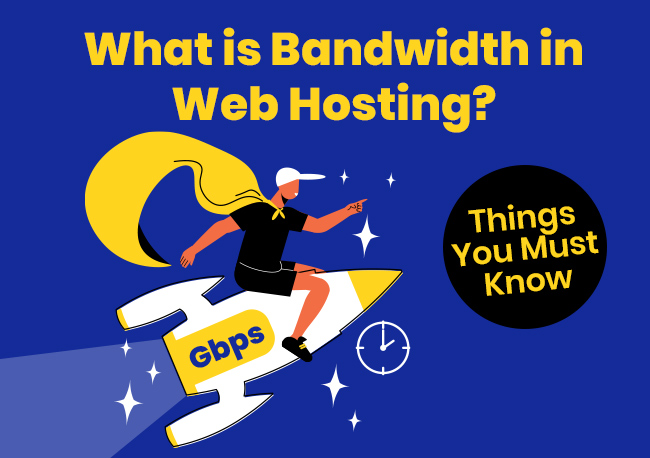Having a hosting plan is essential for people to access your website. In simple language, web-hosting is buying space on a server to store your company’s website’s files.
As of January 2021, over 1.8 billion websites are online on the same daily. Furthermore, the global web-hosting market is projected to grow by 15.1% to reach USD 183.18 billion by 2026.
Successful companies invest in hosting because of increased reliability, data management, security, and long-term savings. One wrong decision and everything can go haywire.
Cheap is not always the best. You may think shared hosting is enough to meet your business requirements, but as time passes, your website will outgrow the shared hosting plan.
Also Read: 5 Things Small Business Should Know About Web Hosting
What is the difference between VPS and a dedicated server? This blog will discuss the same in detail.
Also Read: Web Hosting Guide For Beginners
What is VPS or Dedicated server hosting?
What is VPS Hosting?

Unlike shared hosting, VPS hosting does not compel you to share resources with other clients. It means that you get a more significant share of CPU, memory, disk, etc., but the downside is that you may have to deal with slower page speeds and sluggish server performance.
Once your shared hosting plan is no longer able to meet your present business needs, it is time to switch to VPS hosting. How does a VPS hosting plan work? In a data center lies a giant, physical server.
Using the virtualization concept, the hosting company creates multiple server partitions and allots them to various clients. Every partition gets a fixed share of resources. Even if some partitions experience increased traffic, other partitions will remain unaffected.
On many occasions, if a particular partition does not require a specific resource, it is allocated to someone who needs it. A VPS server is similar to a dedicated server because it allows greater flexibility and control over resources. Still, at the same time, it does not provide an exclusive right to resources.
The most prominent advantage of VPS-based hosting server is that it is cost-effective, plus it allows businesses to enjoy a larger share of resources. In addition to this, each partition has the liberty to install its operating system.
Before switching to a dedicated server, make it a point to gain extensive knowledge about it. Please understand that you will be responsible for server installation, configuration, and maintenance. If you don’t have the expertise or the time for server-related activities, you can choose managed VPS hosting.
Also Read: What Is VPS Hosting And When To Choose It?
What is dedicated server hosting?

When you hear the term – dedicated server hosting, you pretty much get the idea. With a dedicated hosting plan, your website gets complete server resources. Apart from that, you also get to enjoy improved performance and greater security, not to mention flexibility and a unique IP address.
Not every business has the budget to purchase a dedicated server. Neither does everyone have a fleet of IT professionals to configure and maintain servers. A dedicated hosting service provider takes on the responsibilities mentioned above, helping you save time and money.
No form of hosting like VPS hosting or sharing hosting can ever match the functionality and freedom that a dedicated hosting server offers. After you sign up for dedicated hosting, all you get is a plain server. You can add features and elements to it as time passes.
Since you have a dedicated operating system and complete access, you can customize the server to your liking. There is no specific pattern for large-scale companies and corporations as to when the website experiences heavy traffic.
A business has to be prepared for a huge traffic spike during busy seasons. Having the ability to customize resources like RAM, disk space, CPU, operating system, software installation gives you an edge over your competitors, allowing your employees to be more productive and efficient.
Salient features of a dedicated server.
- Improved website performance
- Increased flexibility, scalability & ease of use
- Increased security
- Increased reliability
Also Read: What Is Dedicated Server? Advantages Of Dedicated Server Hosting
The only drawback is that you have to shell out more for dedicated server hosting. It is not cheap like shared hosting, and it costs more than VPS hosting, but the benefits exceed both of them. Also, you should be ready for server management and related administrative tasks.
As a business owner, you need to make up your mind and analyze if you need dedicated server hosting. If the added investment enriches your business and proves to be beneficial, by all means, go for it.
However, if you are not ready to make a sizeable investment and unsure whether you need dedicated server hosting, you can postpone the switch. Even with dedicated servers, there are four types.
- Basic dedicated servers
- Standard dedicated servers
- Enterprise dedicated servers
- High performance dedicated servers
Also Read: 7 Reasons To Select A Dedicated Server
If you are unsure which one to select, consult an expert or your IT manager who can guide you.
Read: Understanding And Simplifying Your Web Hosting Requirements
VPS Hosting Vs. Dedicated Hosting
Let’s take a look at how VPS hosting and dedicated hosting match up in every aspect.
Also Read: VPS Hosting Vs. Cloud Hosting For Your Website
1. Performance

If we look at Google’s SEO algorithm, website speed, user experience, and website performance top the list. With access to increased resources, a VPS hosting server allows your website to load faster while ensuring optimal user experience.
A VPS hosting plan is more like a basic version of dedicated hosting with some limitations and restrictions, but it gives you a lot more than shared hosting.
On the other hand, a dedicated hosting server provides you exclusive access to resources like RAM, CPU, data storage, freedom to install software of your choice, etc., which allows you to get more out of your hosting.
Think of VPS as an economy car that can accommodate your friends and take you to your destination. A dedicated hosting plan does that and more. It can take you to your destination in half the time with more comfort while providing you with unique features.
Also Read: What Does Your Web Host Have To Do With Your SEO?
2. Resources

In the case of a VPS hosting plan, every user or partition gets a share of the allocated resources. Each section works independently, and a hypervisor facilitates communication between the virtual server and the physical server.
All the partitions get a chunk of the giant physical server’s resources. None of the individual partition’s resource usage affects the other.
With a dedicated server, the entire server’s reserved resources are yours. For example, you have a broadband connection, and your neighbor has a leased line. With your broadband connection, the bandwidth varies; the download speed is greater than the upload speed, while an X person’s internet usage could impact your performance.
Your neighbor who has purchased a leased line will enjoy a dedicated connection between his premises and the local exchange. Other people’s usage will not affect his leased line’s performance.
3. Security

In an online environment, security is of utmost importance. If your website or business deals with sensitive information like credit card numbers, identity documents, etc., then hosting is mandatory. It guarantees the safety and security of customer’s data and also that of the organization.
A VPS hosting server splits the server into various partitions, providing more security and privacy than shared hosting. Moreover, companies get access to root access and private server space in both forms of hosting, which helps deal with online threats like hackers, virus attacks, phishing, etc.
But at the end of the day, a VPS server is like an advanced form of shared hosting, with more access to resources and increased privacy but still shared in a broader sense.
For websites and organizations that demand more privacy, safety, and a higher share of resources, dedicated server hosting is the best choice.
Also Read: Website Safety With Secure Hosting
4. Configuration and personalization

Both VPS hosting and dedicated hosting provides useful features like root access, freedom to install applications, etc., which enables businesses to configure the system as per their requirements.
All of this sounds great, but you need to understand that server maintenance and configuration require a great deal of technical expertise. One small mistake could result in a complete crash leading to decreased productivity and efficiency.
There is a solution to this. Both VPS hosting and dedicated hosting have managed plans. You can opt for either one of them if you don’t want to get into the hassle of server maintenance and installation.
Alternatively, if you want to be in total control of server maintenance, installation, and other aspects, unmanaged hosting is the solution.
5. Scalability
 As your business grows, you need to upgrade your hosting plan to meet the increased business demands. A VPS hosting system allows you to scale up, increase storage space, RAM, CPU, and other features without experiencing downtime.
As your business grows, you need to upgrade your hosting plan to meet the increased business demands. A VPS hosting system allows you to scale up, increase storage space, RAM, CPU, and other features without experiencing downtime.
With a dedicated hosting server, it is not possible to achieve more scalability. You have got the maximum resources and maximum flexibility, scalability, so the one way you can scale up is by adding extra hardware to boost RAM, CPU, etc.
If you anticipate a traffic spike with a dedicated hosting server, you need to notify the IT engineer about making the necessary changes.
Also Read: How Do You Point Out The Right Host For Your Website And Why Should You Do So?
6. Price

VPS hosting is an economical option for those who have outgrown the needs of shared hosting and desire something extra. However, when you feel that you need a hosting plan that allows complete freedom, flexibility, and performance, it is time to switch to dedicated hosting.
It is a known fact that the extra resources, freedom, and flexibility come at an additional cost, but it is worth it. A VPS hosting plan is for medium-sized and budget-conscious businesses. In contrast, a dedicated hosting plan is for corporate firms and other well-established companies.
VPS server vs. dedicated server – Which is the right one for your business?
Choosing between a VPS hosting server and a dedicated hosting server is not easy. It may be tempting to opt for a dedicated server, but you also have to consider your organization’s needs.
Is your company ready to make a sizable investment? Do you need dedicated hosting?
Ask yourself these questions before signing that check. If VPS hosting is enough to meet your needs, there is no point in spending money on dedicated hosting.
VPS hosting can provide you with reasonable flexibility, freedom, and customization options to run a smooth business. In the future, if you want additional resources and more flexibility, you can make a move to dedicated hosting.
Host IT Smart has a wide array of hosting options that can take your business to the next level. Be it shared hosting, VPS hosting, or dedicated hosting, we have the answer to all your hosting needs.
Are you confused as to which kind of hosting is the right one for your business?
Call Host IT Smart, and we will walk you through it.
Be smart; choose Host IT Smart.




